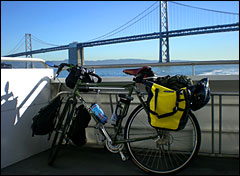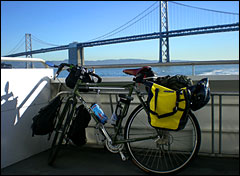Dear Umbra,
I have three choices in how I travel the 15 or so miles between my house and my job: car, light rail, and ferry. Each one, depending on the time and the day, has its advantage in terms of time, convenience, practicality, and enjoyability. If we assume that all the logistical factors are essentially equal, which is the most environmentally virtuous? As a follow-up, what would you consider the tipping point of cost or convenience (twice the time? half the cost?) in making the choice?
Freddy
Alameda, Calif.
Dearest Freddy,
Ah, the Bay Area life. Which pleasant mass transit option shall I take to work today? That’s the kind of dilemma we all like to have. (No ferry over where I am, but I’m going to make a billion dollars and reduce greenhouse-gas emissions with my new Super Sled, a giant toboggan powered by cow farts. It carries 25 people, cuts down road plowing costs, and there are free maple candies with every fifth voyage. I’m still working on the frostbite problem.)
Happily, longtime Grist friend Clark Williams-Derry, genius that he is, has answered part of this question for you in a climate-focused transportation ranking for Sightline, the think tank where he works. Any of you who do have choices about how to get to work, including carpools, vanpools, intercity and transit buses, Amtrak, and biking, will have your questions answered by this simple graph. A car with a solo driver is the worst way to get anywhere, although the Prius does beat out a low-occupancy bus.
Unfortunately for both me and you, Clark did not add ferries to his chart. We will get some straight dope from Clark in a bit, but first I have some other information for you. Ferry emissions include your transport to the terminal, in addition to the emissions from the diesel engine of the ferry itself. I did find a few CO2-per-passenger-mile numbers that we could compare to Clark’s chart, but they will certainly be less mathematically rigorous. One source gives us 0.047 kg of CO2 per person per km of ferry travel, which puts the ferry near the intercity bus on Clark’s chart — a good lower-carbon option. I would adjust this ranking, since we don’t know the efficiency/fuel use of your actual ferry, and say that at best the ferry is equal to the (according to the chart, slightly less efficient) light rail — but only if you access it via other mass transit or by foot or bike. So: a slightly higher-carbon ranking than the mostly full bus, but ferry and rail are still two good alternatives.
I also found an actual study [PDF] of your actual ferry system, from 2002, which directly addresses your car vs. ferry dilemma. For example, “Table ES-4: Percent Change in Emissions Due to Changing from On-Land Commute to Ferry Commute …” Looking at the Alameda/Oakland route, the NOx emissions increase on a ferry commute, but all other emissions significantly decrease. So, given my mathematical limitations, I would say avoid the car and feel easy choosing ferry or rail.
This is somewhat borne out by Clark’s own response to your problem, which I posed to him. And I quote, “Individual choices do matter, but less than we hope. It’s the characteristics of the system that determine transportation CO2: total road capacity, average commute distance, characteristics of the vehicle fleet, etc.” He also hammers home a point I too often forget to make: “The biggest impact that individuals have is on changing the system as a whole: e.g., lobbying for congestion charges that lower traffic volumes and reduce fuel waste from congestion, or parking charges that reduce the incentive to drive.”
In other words, ride mass transit when you can, and support any municipal changes that render driving inconvenient.
I cannot answer the second part of your question, as those decisions are yours to make based on factors in your own life — how much commute time you have, your budget, your patience, etc. Sorry.
Semi-helpfully,
Umbra



